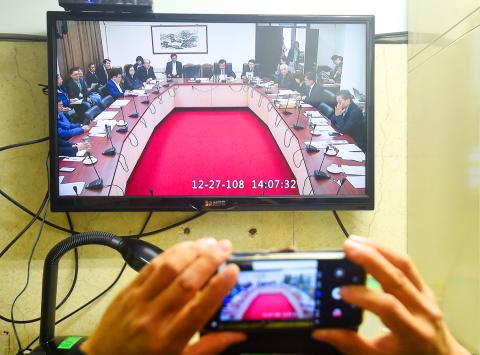The first round of cross-caucus negotiations on an anti-infiltration bill yesterday yielded few results after lawmakers failed to agree on the wording of a draft article.
Despite the Legislative Yuan being in recess, Legislative Speaker Su Jia-chyuan (蘇嘉全) called for the talks ahead of a final review scheduled for Tuesday next week.
Article 1 of the draft legislation reads: “This act was drafted to prevent intervention and infiltration by external hostile forces to ensure national and social security, as well as to uphold the nation’s sovereignty and democratic and constitutional institutions.”

Photo: Liao Chen-huei, Taipei Times
People First Party caucus whip Lee Hung-chun (李鴻鈞) asked why the article says: “external hostile forces,” instead of “external forces.”
The US and Japan are not hostile, but could also pose threats to the nation in terms of commerce, as could the Philippines, whose forces in 2013 fired on a Taiwanese fishing vessel, he said.
Mainland Affairs Council Minister Chen Ming-tong (陳明通) said that the countries Lee mentioned do not plan to infiltrate Taiwan; undermine its democratic and constitutional institutions; engage in a military confrontation with the nation; seek to eliminate it by force; or endanger its sovereignty through non-peaceful means, and are therefore not the subjects of the bill.
The Chinese Nationalist Party (KMT) caucus said that “the nation’s sovereignty” should be changed to “the sovereignty of the Republic of China.”
Democratic Progressive Party (DPP) caucus whip Ker Chien-ming (柯建銘) said that motions related to the article should be deliberated further at Tuesday’s legislative meeting.
The DPP caucus then proposed altering Article 2, which includes groups, organizations and agencies “supervised by” the government, affiliated organizations or any intermediary of an external hostile force.
The wording “supervised by” should be removed, as the Chinese Communist Party (CCP) assigns “secretaries” at larger Chinese firms, some of which hire Taiwanese, but that does not mean those Taiwanese help the CCP infiltrate Taiwan, DPP caucus director-general Kuan Bi-ling (管碧玲) said.
The KMT caucus filed two motions to amend the article.
One sought to change the wording “nations or groups that advocate compromising the nation’s sovereignty through non-peaceful means” to “nations or groups that resort to violence or coercion and have carried out actions compromising the nation’s sovereignty.”
The other recommended the inclusion of a requirement that the Executive Yuan regularly publish “sources of infiltration,” as otherwise the public would not know which groups or organizations to avoid.
New Power Party Legislator Huang Kuo-chang (黃國昌) said that the wording “resorts to violence or coercion” is redundant, as that falls under the original phrasing: “non-peaceful means.”
Kuan objected to the proposal that the Cabinet publish sources of infiltration, saying that as the bill does not give any relevant agencies a blank check, the requirement could give the Executive Yuan undue power.
The lawmakers resolved to also defer all motions related to the article for further deliberation on Tuesday.
Following more than three hours of discussion, the four caucuses only managed to discuss two of the 12 articles of the bill and only agreed on the legislation’s title: the anti-infiltration act.

DAREDEVIL: Honnold said it had always been a dream of his to climb Taipei 101, while a Netflix producer said the skyscraper was ‘a real icon of this country’ US climber Alex Honnold yesterday took on Taiwan’s tallest building, becoming the first person to scale Taipei 101 without a rope, harness or safety net. Hundreds of spectators gathered at the base of the 101-story skyscraper to watch Honnold, 40, embark on his daredevil feat, which was also broadcast live on Netflix. Dressed in a red T-shirt and yellow custom-made climbing shoes, Honnold swiftly moved up the southeast face of the glass and steel building. At one point, he stepped onto a platform midway up to wave down at fans and onlookers who were taking photos. People watching from inside

A Vietnamese migrant worker yesterday won NT$12 million (US$379,627) on a Lunar New Year scratch card in Kaohsiung as part of Taiwan Lottery Co’s (台灣彩券) “NT$12 Million Grand Fortune” (1200萬大吉利) game. The man was the first top-prize winner of the new game launched on Jan. 6 to mark the Lunar New Year. Three Vietnamese migrant workers visited a Taiwan Lottery shop on Xinyue Street in Kaohsiung’s Gangshan District (崗山), a store representative said. The player bought multiple tickets and, after winning nothing, held the final lottery ticket in one hand and rubbed the store’s statue of the Maitreya Buddha’s belly with the other,

‘NATO-PLUS’: ‘Our strategic partners in the Indo-Pacific are facing increasing aggression by the Chinese Communist Party,’ US Representative Rob Wittman said The US House of Representatives on Monday released its version of the Consolidated Appropriations Act, which includes US$1.15 billion to support security cooperation with Taiwan. The omnibus act, covering US$1.2 trillion of spending, allocates US$1 billion for the Taiwan Security Cooperation Initiative, as well as US$150 million for the replacement of defense articles and reimbursement of defense services provided to Taiwan. The fund allocations were based on the US National Defense Authorization Act for fiscal 2026 that was passed by the US Congress last month and authorized up to US$1 billion to the US Defense Security Cooperation Agency in support of the

HIGH-TECH DEAL: Chipmakers that expand in the US would be able to import up to 2.5 times their new capacity with no extra tariffs during an approved construction period Taiwan aims to build a “democratic” high-tech supply chain with the US and form a strategic artificial intelligence (AI) partnership under the new tariffs deal it sealed with Washington last week, Taipei’s top negotiator in the talks said yesterday. US President Donald Trump has pushed Taiwan, a major producer of semiconductors which runs a large trade surplus with the US, to invest more in the US, specifically in chips that power AI. Under the terms of the long-negotiated deal, chipmakers such as Taiwan Semiconductor Manufacturing Co (TSMC, 台積電) that expand US production would incur a lower tariff on semiconductors or related manufacturing